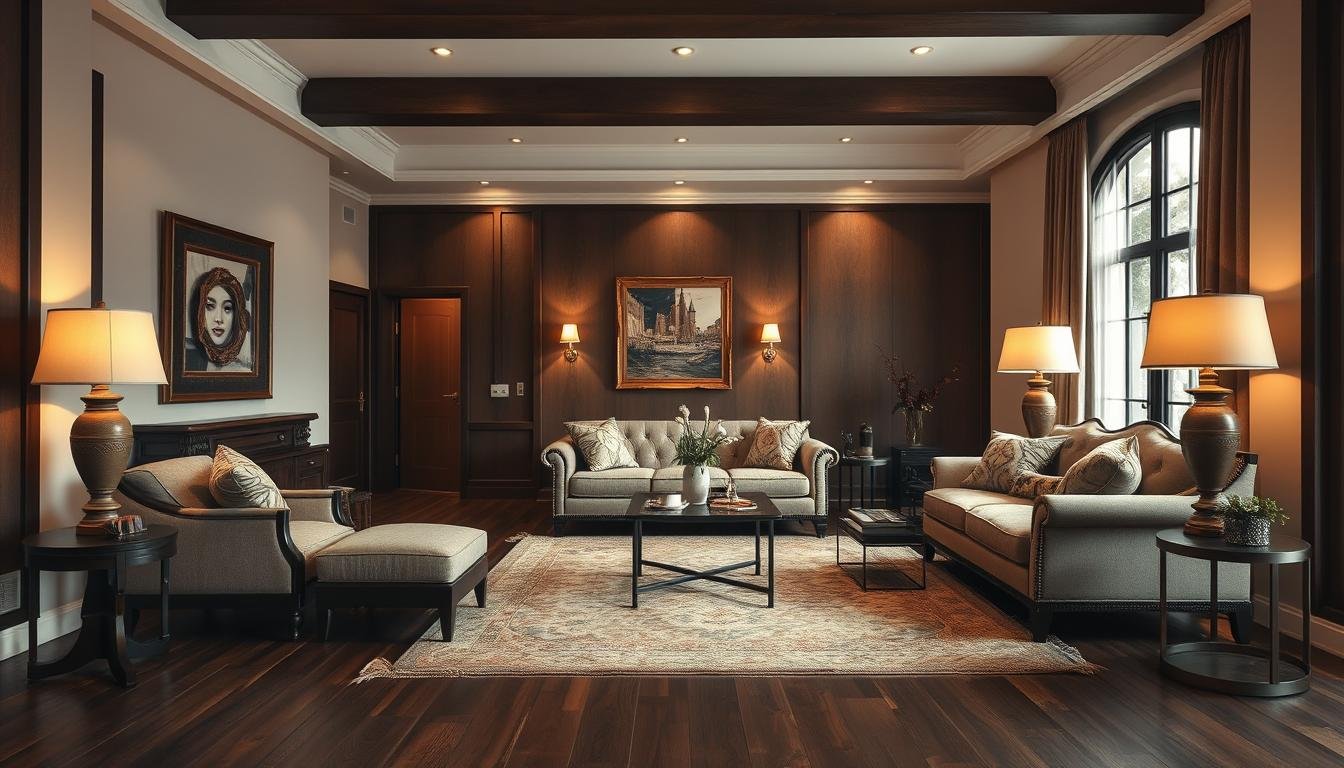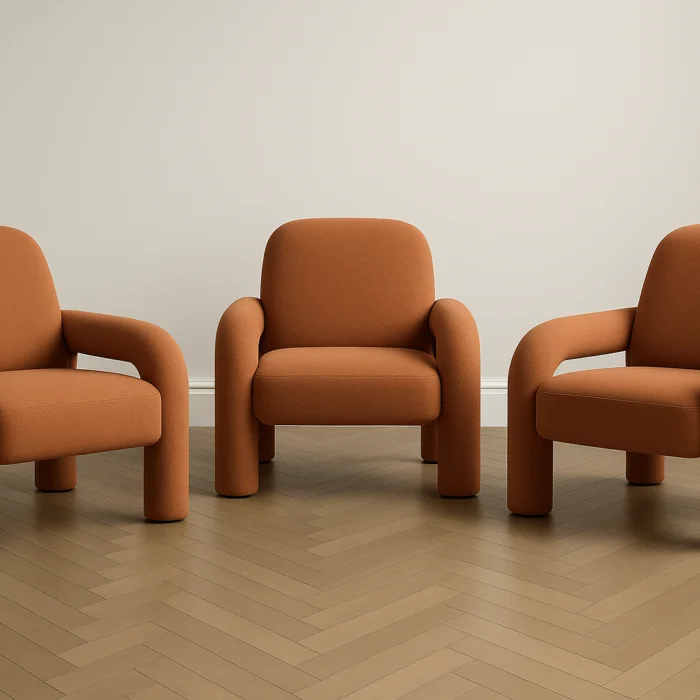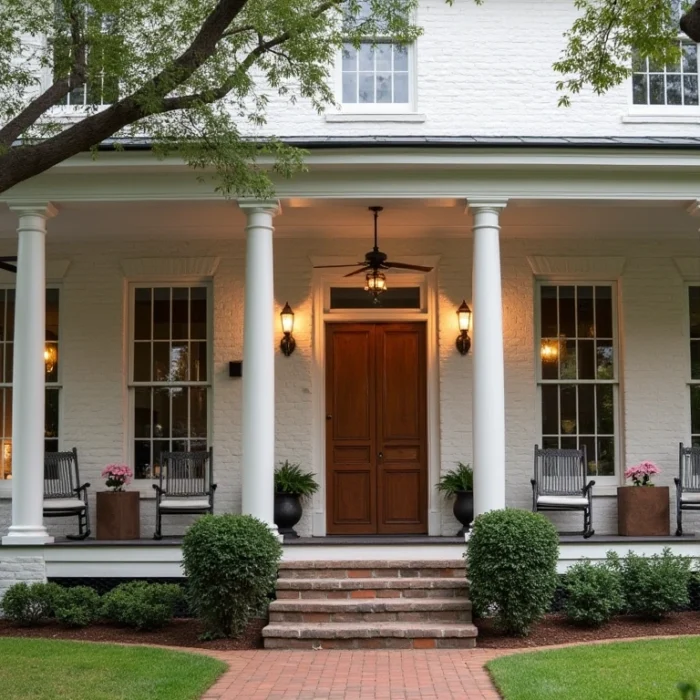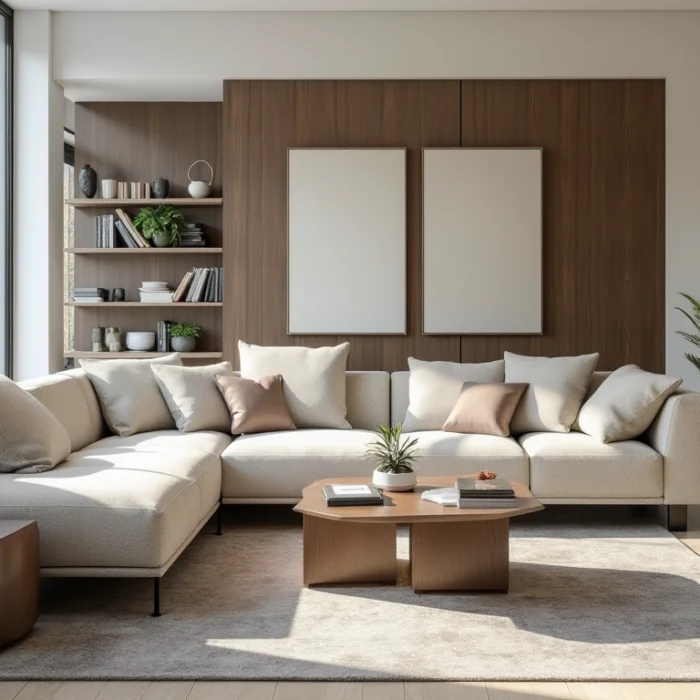When you enter your dream home, the dark wood floors catch your eye. They bring a sense of luxury and timeless beauty. But, it’s important to think about the good and bad points of dark wood floors before deciding.
Dark wood floors have a unique charm that makes any room feel cozy and elegant. They hide stains and marks well, which is great for busy homes with pets and kids. These floors also add warmth and coziness to big rooms, perfect for traditional or formal settings.
But, dark wood floors have their downsides too. They show dust, pet hair, and other dirt easily, needing more cleaning. Scratches and dents stand out more on these floors, especially in busy areas. Also, in small rooms or places with little light, dark hardwood can feel heavy and small.
When choosing dark wood floors, it’s key to consider both the good and bad sides. This way, you can pick the right option for your home. By thinking about these points, you can make a choice that makes your home look and feel great.
Table of Contents
Understanding Dark Wood Floor: A Complete Overview
Dark hardwood floor have long been seen as symbols of luxury and sophistication. But, recent trends show a move towards lighter wood options. Dark floors like oak, maple, and walnut add a rich, dramatic flair. Yet, lighter options are becoming more popular for their ability to make spaces feel more open and airy.
Types of Dark Wood Species
There are many types of dark hardwood floors, each with its own unique look. Some of the most sought-after dark wood choices include:
- Oak – Known for its distinctive grain patterns and durability, oak is a classic choice for dark hardwood floors.
- Maple – Maple floors offer a smooth, uniform appearance with a subtle grain, making them a popular pick for a modern, refined look.
- Walnut – Walnut wood floors provide a deep, warm tone and a luxurious feel, adding a touch of elegance to any space.
Popular Dark Wood Stains and Finishes
To enhance the natural beauty of dark wood floor, homeowners often choose specific stains and finishes. Some popular choices include:
- Ebony – A rich, inky black tone that creates a bold, dramatic statement.
- Espresso – A deep, chocolate-brown hue that exudes sophistication.
- Dark Walnut – A warm, reddish-brown tone that adds depth and character to a space.
Current Design Trends
While dark wood floors were once a staple in luxury homes, the current design landscape shows a shift towards lighter hardwood options. Homebuyers are increasingly drawn to the airy, open feel of light wood floors. These floors can make rooms appear larger and brighter. However, dark wood floors still maintain their appeal, particularly for those seeking a cozy, inviting atmosphere or a classic, sophisticated aesthetic.
“Dark wood floors add a timeless elegance and richness to any space, while lighter floors create a more modern, refreshing ambiance. The choice ultimately depends on the homeowner’s personal style and the overall design goals for the space.”
The Impact of Dark Wood Floors on Home Value
Dark wood floors can greatly increase your home’s value. They are seen as timeless and sophisticated, fitting well with high-end homes. But, how much they boost value depends on current trends and local tastes.
Recent data shows dark-stained floors are becoming more popular, with light-colored ones close behind. Dark floors add a dramatic elegance that many find appealing. Yet, light floors might be better for hiding scratches.
| Flooring Type | Impact on Home Value |
|---|---|
| Dark Wood Floors | Can significantly increase a property’s resale value, especially in upscale or contemporary settings. |
| Light Wood Floors | Can make a room feel more spacious and airy, which may be desirable for some buyers, particularly in smaller spaces or those with limited natural light. |
The effect of dark wood floors on home value changes with regional tastes and market trends. Homeowners should think about local markets and buyer preferences when picking flooring.
Choosing the right flooring can significantly affect a home’s resale value and appeal. Knowing the pros and cons of dark wood floors helps homeowners make a smart choice that boosts their investment’s value.
“Dark hardwood floors have been a staple in interior design for generations, and they can significantly increase a property’s resale value.”
Advantages of Installing Dark Wood Floors
Dark wood floors add elegance and sophistication to your home. They hide stains, scuffs, and marks well. This makes them perfect for homes with kids or busy areas. Dark hardwood floors also make rooms feel cozy and welcoming, especially in big spaces.
Elegant and Sophisticated Appearance
Dark hardwood floors bring a timeless charm to any room. The deep tones of oak, walnut, and mahogany add luxury. They make your dark floor interior design look opulent. These floors are great for big rooms, making them feel more intimate.
Ability to Hide Stains and Marks
Dark wood floors in kitchen or busy areas hide stains and marks well. Unlike light floors, dark ones stay polished longer. They are more forgiving and keep your floors looking good for longer.
Creating Cozy Atmosphere
Dark wood floors also create a cozy feel in any room. Their rich tones and warm undertones make spaces feel more intimate. This is especially true in big rooms or areas with high ceilings. It’s great for living rooms, bedrooms, and other places you want to relax.
Drawbacks and Maintenance Challenges
Dark wood plank floors add elegance to your home. Yet, they also have downsides and upkeep needs. Dust, pet hair, and footprints show up more on dark floors. So, you’ll need to clean them often to keep them looking great.
Dark wood floors also highlight scratches and dents. The dark finish makes any flaws stand out more. This is a big worry in busy homes with pets and kids.
- Dark floors show dirt, dust, and pet hair more clearly, requiring more frequent cleaning
- Scratches and dents are more noticeable on dark surfaces due to the contrast with the lighter wood underneath
- In small or dimly lit spaces, dark floors can create a more closed-in or claustrophobic feel
- Dark floors may not complement all design styles, particularly in casual or minimalist settings
Think carefully about the pros and cons of dark hardwood floors. With the right care and attention to your space’s design, dark floors can be a beautiful addition to your home.
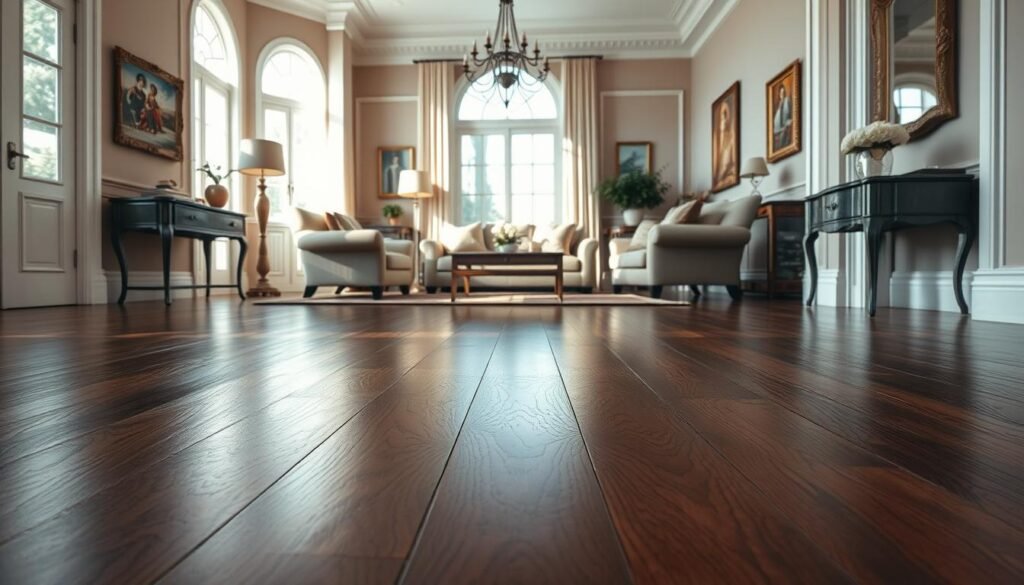
Dark Wood Floors in Different Room Settings
Dark wood floors add timeless elegance to any room. They can make living rooms cozy, kitchens inviting, and bedrooms warm. These floors create unique looks and moods in each space.
Living Room Applications
In living rooms, dark wood floors bring sophistication and warmth. They’re durable and can handle lots of foot traffic. With the right care, they stay beautiful for decades.
Dark floors hide scratches, dents, and dirt better than light ones. This makes them great for busy areas.
Kitchen and Dining Areas
Dark wood floors warm up kitchens and dining areas. They look great with light-colored cabinets and countertops. This mix creates a stunning balance that enhances the room’s design.
When combining light and dark hardwood, think about the wood type, grain, and finish. This ensures a unified look.
Bedroom Installations
In bedrooms, dark wood floors create a cozy feel. They add depth and character, but consider the room’s size and light. Dark floors might make small rooms feel smaller.
Think about the room’s size and light when choosing dark wood floors for bedrooms.
Choosing dark wood floors depends on personal taste, design style, and the room’s specifics. Consider durability, contrast, and lighting to make a choice that improves both look and function.
Light vs Natural Light Considerations
When choosing dark hardwood flooring, think about how it interacts with natural light. Rooms with lots of natural light can pull off dark dark floor interior design well. But, in places with little natural light, dark floors might make the room feel smaller and more closed in.
It’s key to think about the natural light when picking between dark and light wood floors. Light floors can brighten up dark rooms, while dark floors work best in bright areas. Light floors can make a room look bigger, while dark floors can make a room feel cozy, especially in rooms with high ceilings.
The effect of dark floors on room size depends on the shade, natural light, and wall color. Homeowners should think about their lifestyle, lighting, and design style when picking the right flooring.
| Considerations | Light Floors | Dark Floors |
|---|---|---|
| Room Appearance | Visually enlarge the space | Create a sense of intimacy in large rooms |
| Dirt and Debris Visibility | Less noticeable | More visible |
| Maintenance | Require more frequent cleaning | Demand less frequent cleaning |
| Design Versatility | Provide a neutral backdrop for decor | Complement traditional, modern, and industrial styles |
In summary, the relationship between dark floors and natural light is vital in home design. By understanding how these elements interact, you can choose flooring that fits your lifestyle, lighting, and style.
Durability and Long-term Performance
Hardwood flooring’s durability and long-term performance are key. Dark wood floors are as durable as light ones but change appearance over time. Their dark color hides sun damage well, great for sunny homes.
Scratch Resistance Factors
Dark wood floors hide sun damage well but show scratches and dents more. To keep them looking new, clean them often and refinish them when needed.
Sun Damage Protection
Dark wood floors, like oak or walnut, hide sun damage well. This makes them a smart choice for sunny rooms. They keep looking elegant and sophisticated for years.
Maintenance Requirements
Dark wood floors need proper care to last long. Clean them with the right products, use mats in busy spots, and avoid harsh cleaners. With the right care, they’ll stay beautiful for years.
| Flooring Type | Lifespan | Moisture Resistance | Refinishing Potential | Cost Effectiveness |
|---|---|---|---|---|
| Engineered Hardwood | 20-30+ years | Moderate | Multiple times | Moderate |
| Solid Hardwood | Decades | Low | Multiple times | High |
| Laminate | 15-25 years | High | Limited | Low |
| Vinyl | 10-20 years | High | Limited | Low |
“Proper care and maintenance of high-quality engineered hardwood with thicker wear layers can enhance durability and potentially extend its lifespan.”
Design Compatibility and Style Matching
Dark wood floors are versatile and timeless, fitting many styles from traditional to modern. They have a rich, sophisticated look that goes well with many colors and designs.
In traditional or formal rooms, dark wood floors look great with rich colors like deep burgundies and emerald greens. The dark floors and bold wall colors make a stunning, welcoming space. In eclectic or transitional rooms, dark wood floors help tie together different styles, creating a balanced look.
But think about the style and mood you want. Dark wood floors might not fit casual or minimalist styles, where a lighter feel is better. Lighter wood tones or painted floors could work better for these looks, making the space feel more open.
Choose light wall colors to contrast with dark wood floors, like soft creams and pale greys. This contrast prevents the room from feeling heavy. You can also try warmer neutrals like taupe or beige to highlight the wood’s warm tones.
The wood’s undertones also affect color choices. Warm-toned floors go well with green, blue, or earthy colors. Cool-toned floors look great with grey or blue wall colors.
Success with dark wood floors comes from knowing your style and choosing colors and furnishings that enhance the wood. By finding the right balance, you can create a beautiful, harmonious space that shows off your personal taste.
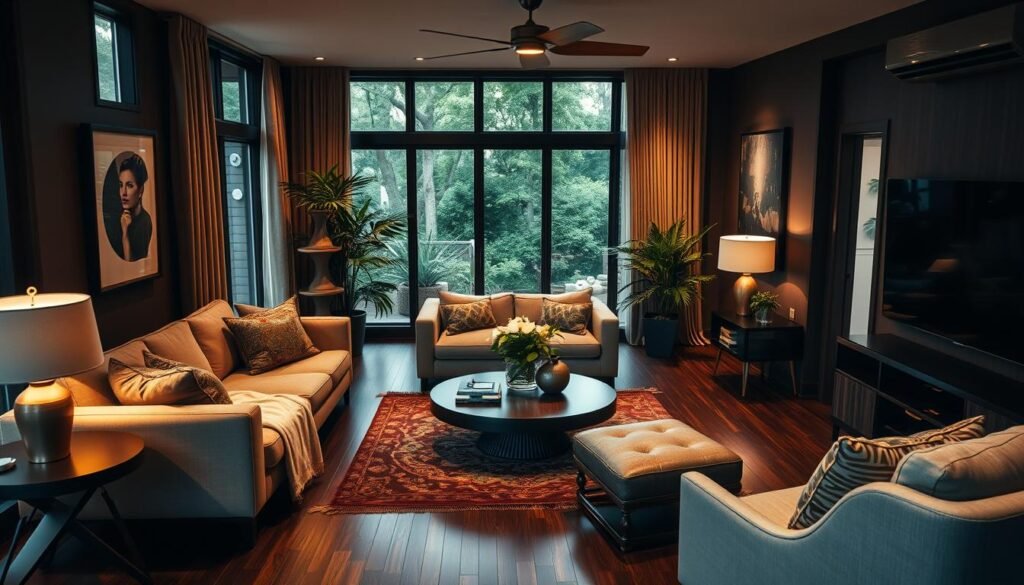
Cost Analysis and Investment Value
Hardwood flooring’s initial cost is a big deal. But, its long-term benefits make it a smart choice for many. Homes with hardwood floors can see a 2.5% value increase, with 54% of buyers willing to pay more. Also, 99% of realtors find homes with hardwood floors easier to sell, and 82% sell faster.
The cost per square foot for solid hardwood is $6 to $23. Engineered wood and laminate are $2 to $12. Though the start-up costs are high, the value of hardwood floors over time is clear. Real estate agents say homes with hardwood floors can increase in value by up to 10%. Solid hardwood floors can return 70 to 80% of the investment.
| Flooring Type | Cost per Square Foot |
|---|---|
| Solid Hardwood | $6 – $23 |
| Engineered Wood | $6 – $23 |
| Laminate | $2 – $8 |
| Carpet | $7 – $12 |
| Vinyl/LVP | $2 – $12 |
When looking at hardwood flooring’s value, think about the initial cost and long-term care. With proper care and refinishing, hardwood floors last long. They add beauty and value to your home.
Installation Tips and Best Practices
Installing dark wood floors requires attention to detail and proper preparation. While hiring a professional is often recommended, some homeowners prefer to do it themselves. Knowing the tools, materials, and common mistakes can help ensure your floors last long and look great.
Professional vs DIY Installation
Hiring a professional installer is usually the best choice for quality and durability. They know how to prepare the subfloor and acclimate the wood. But, if you’re up for the challenge, DIY installation can save money and be rewarding.
Necessary Tools and Materials
- Moisture meter: Essential for checking the subfloor’s moisture content before installation
- Underlayment: Provides a stable, level surface and helps absorb noise and impact
- Appropriate fasteners: Depending on the installation method, you may need nails, staples, or a specialized adhesive
- Cutting tools: Saws, jamb saws, and other tools for precise wood trimming and shaping
- Spacers: Ensure consistent board spacing and allow for proper expansion and contraction
Common Installation Mistakes to Avoid
- Inadequate subfloor preparation: Failure to level, clean, and address any subfloor issues can lead to uneven floors and premature wear.
- Improper acclimation of the wood: Not allowing the wood to adjust to the room’s temperature and humidity can result in warping, cupping, or gapping.
- Inconsistent board spacing: Improper use of spacers can cause the floors to buckle or separate over time.
By following best practices and avoiding common pitfalls, you can ensure a successful installation of your dark wood floors. Whether you hire a professional or do it yourself, the right approach will make your floors beautiful and durable. Your new hardwood floors will enhance your home’s look and last for years.
Conclusion
Dark wood floors add elegance, warmth, and practicality to any room. They can boost your home’s value and create a sophisticated look. But, remember, they also come with maintenance challenges and need to fit your lifestyle and space.
Choosing dark wood floors means thinking about room size, natural light, and design. Dark tones like mahogany or walnut bring luxury. Light hardwood floors make rooms feel bigger and more open. Your choice depends on your style and decor.
Dark wood floors can be a great choice for your home, but know the pros and cons. Understand the upkeep and design fit. This way, you can create a beautiful and functional space that shows off your style.
FAQ
What are the main advantages of installing dark wood floors in my home?
Dark wood floors add elegance and sophistication. They create a cozy feel. They also hide stains and marks well, perfect for homes with kids or lots of foot traffic.
What are the potential drawbacks of dark wood floors?
Dark wood floors show dust, pet hair, and footprints more. They need more cleaning and upkeep. Scratches and dents stand out more on dark floors.
In small spaces or rooms with little light, dark floors can feel cramped.
How do dark wood floors impact the value of a home?
Dark wood floors can boost a home’s value. They look luxurious and timeless. They’re often seen as a sign of high-end homes.
But, the effect on value depends on design trends and buyer preferences in your area.
What are the different types of dark wood species used for flooring?
Oak, maple, and walnut are common dark wood species for flooring. They can be stained or finished in dark tones to highlight their beauty and protect them.
How do dark wood floors perform in terms of durability and long-term maintenance?
Dark wood floors are as durable as lighter ones. But, their look may change over time. They resist sun damage less, but scratches and dents are more noticeable.
Regular cleaning and refinishing are key to keeping them looking great.
How do dark wood floors complement different design styles?
Dark wood floors suit rich color schemes and add depth. They fit well with traditional, formal, or eclectic styles. But, they might not suit casual or minimalist looks as well.
What factors should I consider when choosing between dark and light wood floors?
Think about room size, natural light, lifestyle, and design preferences when choosing. Dark floors are cozy in big rooms but might overwhelm small ones with little light.
What are the typical installation requirements for dark wood floors?
Installing dark wood floors needs careful planning and execution. Professional installation is often best for the right preparation and finish. DIY requires the right tools, materials, and attention to details like subfloor prep and wood acclimation.
Source Links
- Dark vs Light Wood Floors: Unveiling the Unseen Battle – California Flooring and Design – https://www.cafloordesign.com/2024/03/20/dark-wood-vs-light-wood-floors/
- Shedding Light on the Battle: Light Wood vs Dark Wood Floors – California Flooring and Design – https://www.cafloordesign.com/2024/03/19/light-wood-vs-dark-wood-floors/
- Shedding Light on the Debate: Are Dark or Light Hardwood Floors Better? – California Flooring and Design – https://www.cafloordesign.com/2024/02/29/are-dark-or-light-hardwood-floors-better/
- Hardwood Flooring: Should I Go With Dark or Light Colored Flooring? – https://www.outlookflooring.com/blog/articles/hardwood-flooring-should-i-go-with-dark-or-light-colored-flooring
- All About Light Wood Floors – https://www.thisoldhouse.com/flooring/21015810/wood-floors-are-lightening-up
- What Color Hardwood Floor Is Best For Property Value – https://lifestyleflooringsc.com/light-floors-vs-dark-floors-which-is-the-best-choice-in-your-home/
- The Timeless Appeal of Dark Hardwood Floors – East Coast Flooring & Interiors – https://eastcoastfl.com/blog/dark-hardwood-floors/
- Does Hardwood Flooring Color Affect Home Value? – https://www.floorsdirectnj.com/blog/articles/does-hardwood-flooring-color-affect-home-value
- Light vs Dark Colors for Hardwood Floors: Pros and Cons – First Atlanta Flooring – https://www.firstatlantaflooring.com/news/light-vs-dark-colors-for-hardwood-floors-pros-and-cons/?srsltid=AfmBOopFXwyd-oLoEXVohz8QWHak_MHQsXUgVjvevx8q9RgmT3mz7TZY
- Dark vs Light Hardwood Floors: Which Is Right for Your Home? – https://www.nationalfloorsdirect.com/learn/articles/dark-vs-light-hardwood-floors-which-is-right-for-your-home
- Light vs. Dark Hardwood Flooring | Flooring America – https://www.flooringamerica.com/blog/light-vs-dark-which-floors-will-you-choose
- Light Or Dark Hardwood Floors – Dan Custom Hardwood – https://www.dancustomhardwoodfloor.com/light-or-dark-hardwood-floors/
- Dark Wood Floor Ideas for Your Living Room | Matt Britton – https://mattbritton.ie/dark-wood-floor-living-room-inspiration/
- Transformations with a Dark Wood Floor Living Room – https://www.reallycheapfloors.com/blog/dark-wood-floors-in-living-rooms/
- Wall Colors for Dark Wood Floors — 13 Pairings Designers Choose to Make Them Look Modern – https://www.livingetc.com/advice/colors-that-go-with-dark-wood-flooring
- Choosing the Right Flooring Color – https://www.allorafloors.com/blog/light-vs-dark-choosing-the-right-flooring-color
- Should Floors Be Darker or Lighter Than Walls: Find the Perfect Combination – https://www.reallycheapfloors.com/blog/should-floors-be-darker-or-lighter-than-walls/
- Light Vs. Dark: Which Floors Will You Choose – https://www.linkedin.com/pulse/light-vs-dark-which-floors-you-choose-grid-floors-pvt-ltd-eritc
- How Long Does Engineered Hardwood Last? Expert Insights | Villagio Wood Floors – https://villagiowoodfloors.com/how-long-does-engineered-hardwood-last/
- Engineered vs Solid Wood – Choosing the Right Flooring – https://resawntimberco.com/engineered-vs-solid-wood-choosing-the-right-flooring/
- How to Choose Colors that Beautifully Pair with Wood Furniture and Floors – https://www.bhg.com/decorating/color/basics/color-and-wood-tone/
- How to Choose Colours That Complement Your Wooden Floors – https://www.v4.co.uk/how-to-complement-wooden-floors/
- Flooring & Wall Color Combination Guide | Hardwood & Tile – https://shorelinepaintingct.com/blog/flooring-and-wall-color-combination-guide/
- Can Hardwood Flooring Increase Home Value? – Bessemeter – https://www.bessemeter.com/blog/can-hardwood-flooring-increase-home-value/?srsltid=AfmBOoqWf1BK8ucYnYLJ56y6W6G0VMwjoLEADi_-HhdH2vPm331OCSwu
- How Much Does Hardwood Flooring Cost? – https://www.thisoldhouse.com/flooring/reviews/hardwood-flooring-cost
- How Does the Cost of Hardwood Flooring Impact Your Investment and Resale Value? – https://canadianhomestyle.com/flooring/how-does-the-cost-of-hardwood-flooring-impact-your-investment-and-resale-value/
- Engineered Hardwood Flooring Installation Guide: Easy Tips – https://villagiowoodfloors.com/engineered-hardwood-flooring-installation/
- Understand These Wood Science Basics for Better Wood Floors – https://www.woodfloorbusiness.com/installation/moisture/article/15684247/understand-these-wood-science-basics-for-better-wood-floors
- Essential Guide to Hardwood Floor Care: Cleaning Tips and Damage Prevention – https://jrkflooring.com/blog/floor-care-101-how-to-keep-your-hardwood-floors-looking-great/
- Hardwood floor colors: know the trends for 2024! – https://ecoflooringusa.com/blog/hardwood-floor-colors/
- Transform Your Living Room with Dark Brown Wood Flooring – https://www.coohom.com/article/dark-brown-wood-floor-living-room
- Dark Wood Floors in Scandinavian Designs – https://www.floor-sanding.com/dark-wood-floors-in-scandinavian-designs/
